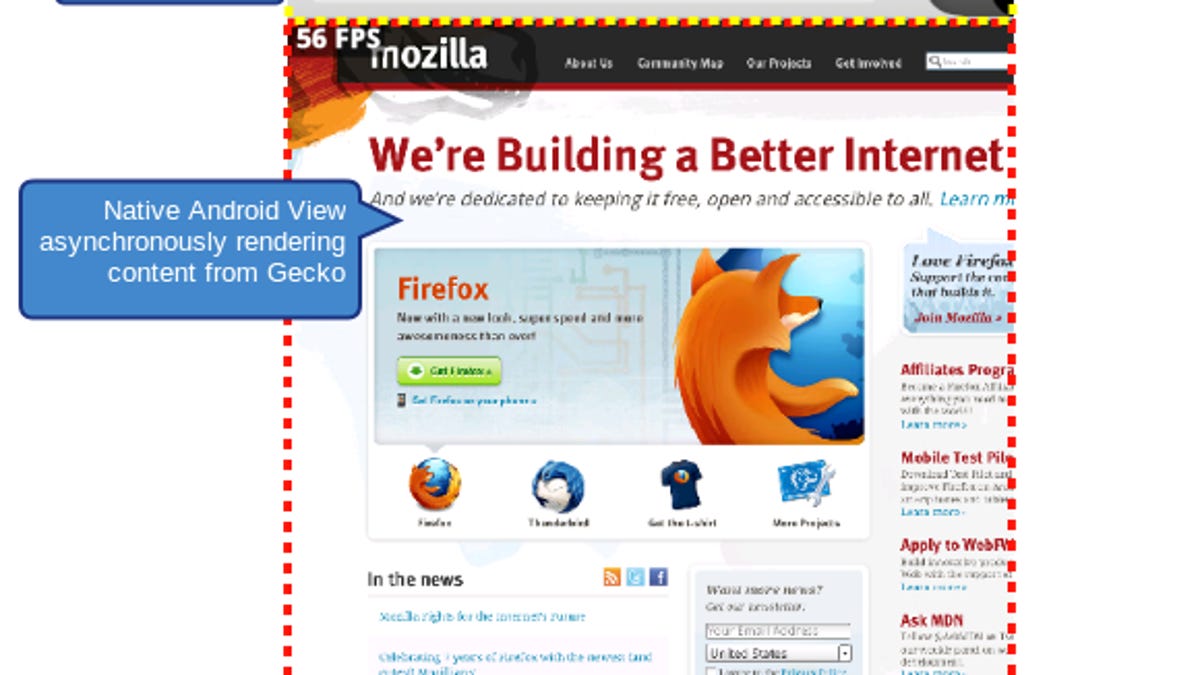Every moment counts in Mozilla's bid for mobile relevance
An overhauled version of Firefox for Android could come shortly after January 31--or maybe six weeks later, a stretch in which Apple might sell 26 million iPhones and iPads.
Mozilla could soon release a beta version of its dramatically overhauled Android browser, a crucial step in the organization's attempt to stay relevant in the tech industry's mobile transformation.
Or it might have to wait six weeks. And, given Mozilla's continuing absence from the explosively growing mobile market, every moment counts.
After the first versions of Firefox for Android browser suffered from slow startup, Mozilla chose to create an Android-only version that employed the native user interface of Google's mobile operating system. That meant forsaking add-ons that historically have been built with Mozilla's own XUL interface, but fixing the slow app launch was critical.
"Native UI is closing in on beta quality," Mozilla said in meeting notes this week. Added developer Mark Finkle in a blog post, "Start-up time is many times faster than the XUL version. Launching via the icon is almost instantaneous."
It uses less memory, too, and will be able to run Android-native add-ons, he said. A native-UI version of Firefox for tablets, too, is part of the group's plans, Finkle said in a presentation on the rebuilt mobile Firefox.
The big question, though, is when it will arrive.
The Android-native Firefox beta might or might not "ride the next train," the meeting notes said, referring to the jump from the rougher "Aurora" browser version to the more broadly used beta version. Under Mozilla's rapid-release process, programmers every six weeks promote nightly versions to Aurora, Aurora versions to beta, and beta versions to final. So if the native version misses the train, so to speak, another train will come relatively soon.
The Firefox 11 beta gets started on January 31, according to the handy Firefox release schedule from Mozilla's Asa Dotzler. It'll become the final Firefox release on March 13, at which point the Firefox 12 beta development will begin.
Six weeks isn't that long by most measures. But these aren't ordinary times. The computing industry is transforming at a breakneck pace, driven by remarkable sales of Apple iOS devices. In the last quarter of 2011, Apple sold 37 million iPhones and 15 million iPads.
In other words, at last quarter's pace, about 26 million iPhones and iPads were sold in six weeks.
And none of them can run Firefox. That's because Apple permits only browsers that use its built-in WebKit browser engine, and its own Safari is the dominant mobile browser worldwide. Android phone sales are also strong, though, and Mozilla's best bet for mobile influence.
For Mozilla, browsers are a means to an end. The nonprofit organization uses browsers--and other technology--to try to keep the Web open and to keep users in control of their own data while using the Internet. So by being largely sidelined in mobile browsing, Mozilla risks losing a means of influence.
The organization has another mobile effort afoot, too, called Boot to Gecko, or B2G. Gecko is the name of Firefox's underlying engine, and B2G is a project to build a browser-based mobile operating system.
If B2G gains traction, it could give Mozilla a new mechanism to pursue its agenda. But unless it finds a big sponsor, it's hard to see how B2G could really take off in any real numbers. The mobile operating system world is dominated by iOS and Android, and there's not much room right now for others.
The BlackBerry OS, despite a solid user base, is faltering; Hewlett-Packard has relegated WebOS to an open-source project without a product line to carry it to market; and Windows Phone is gaining a mere toehold despite massive, sustained investments from Nokia and Microsoft. B2G would have the advantage of being able to run Web apps rather than native apps, which means it would have a developer head start, but in the meantime, mobile apps designed to run natively on Android and iOS show no signs of slowing down.
Mozilla has other plans for relevance beyond browsers, too. Here's how Ben Adida, Mozilla's tech lead for identity and user data, described Mozilla's ambition for letting users control their data earlier this year:
While the browser may be fully under the user's control, many of the services that users enjoy are not. Sometimes, these Web services handle data in ways that are of questionable value to the user, even detrimental. It's clear that Mozilla needs to step up and provide, in addition to the Firefox browser, certain services to enhance users' control over their online experience and personal data.
Those services include the BrowserID technology to let the browser take some control over the username and password chaos and the Mozilla app store for Web apps.
New missions are hard, though, since the vast majority of the world knows about Mozilla only because of Firefox. The browser remains key to Mozilla's future.


